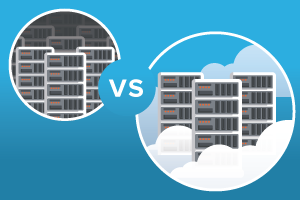ERP has a long history of evolving with changes in technology, and has successfully transitioned from the hardware of the past to more modern software as a service. Yet many companies are still miles away from the ideal ERP solution.
There are many benefits to embracing a cloud-based infrastructure and services. Why is the shift happening and how can cloud financial ERP services provide a better solution and save your organization time and money while increasing visibility and usability?
Traditional ERP systems aren’t meeting needs
On-premise ERP software had their time and place, but the industry haschanged around them. These solutions are installed locally on a computer’s hardware and servers, and then managed by an organization’s IT staff. These systems, which were top of the line years ago, are now time-consuming to set up, manage, and maintain.
In contrast, cloud-based ERP software can be deployed quickly and easily. This software is hosted remotely and is delivered in a SaaS model to clients. Through this model, a firm’s ERP software applications are hosted on a vendor’s servers rather than on their own. Through a subscription platform, clients gain access to the software, hardware, and maintenance services from their remote location.
Cloud Financial ERP tops traditional solutions in three key ways.
On premises ERP systems have seen a decrease in licenses since 2013, around the same time that the concept of cloud computing and SaaS alternatives were on the rise. Today, cloud financial remains a promising alternative to on-premise solutions, and beats the alternative in three key areas:
Setup and implementation
While it's common for ERP rollouts to take a year or more, cloud-based ERP solutions can be set up much more quickly. Service providers streamline the process by deploying pre-configured settings and services with cloud applications. For example, Intacct has a very simple to set up web services API that creates secure two-way communication with other best-in-class cloud applications, such as Salesforce and Adaptive Insights.
Maintenance
Not only do organizations save time with cloud financial software they can save money too. Costs are easier to manage because they are compiled into a yearly rate, which can be paid via monthly subscription. SMBs and midmarket companies that previously could not implement traditional ERP can now gain access to the benefits.
Return on investment
ERP success is never a given, but cloud financial software can offer a path with much less risk.
ERP success is never a given, but cloud ERP software can offer a path with much less risk. Many organizations work from a deficit when they implement ERP due to the steep initial costs. These costs are difficult to recoup in the following months and years. Fortunately, with cloud ERP the process carries less risk. There are far fewer upfront costs than there would be with a traditional ERP approach. Plus, there is the added convenience of having the software delivered and maintained. This means that the organization as a whole spends less time simply keeping the ERP system running, and more time focused on other activities. Teams could devote newly freed up time into integrating new cloud services into their ERP systems.
When it comes to cloud ERP vs. on-premise solutions the long term winner is clear. At RKL, our technology experts help identify how cloud ERP may help your organization. Contact us for a complementary system assessment today!



